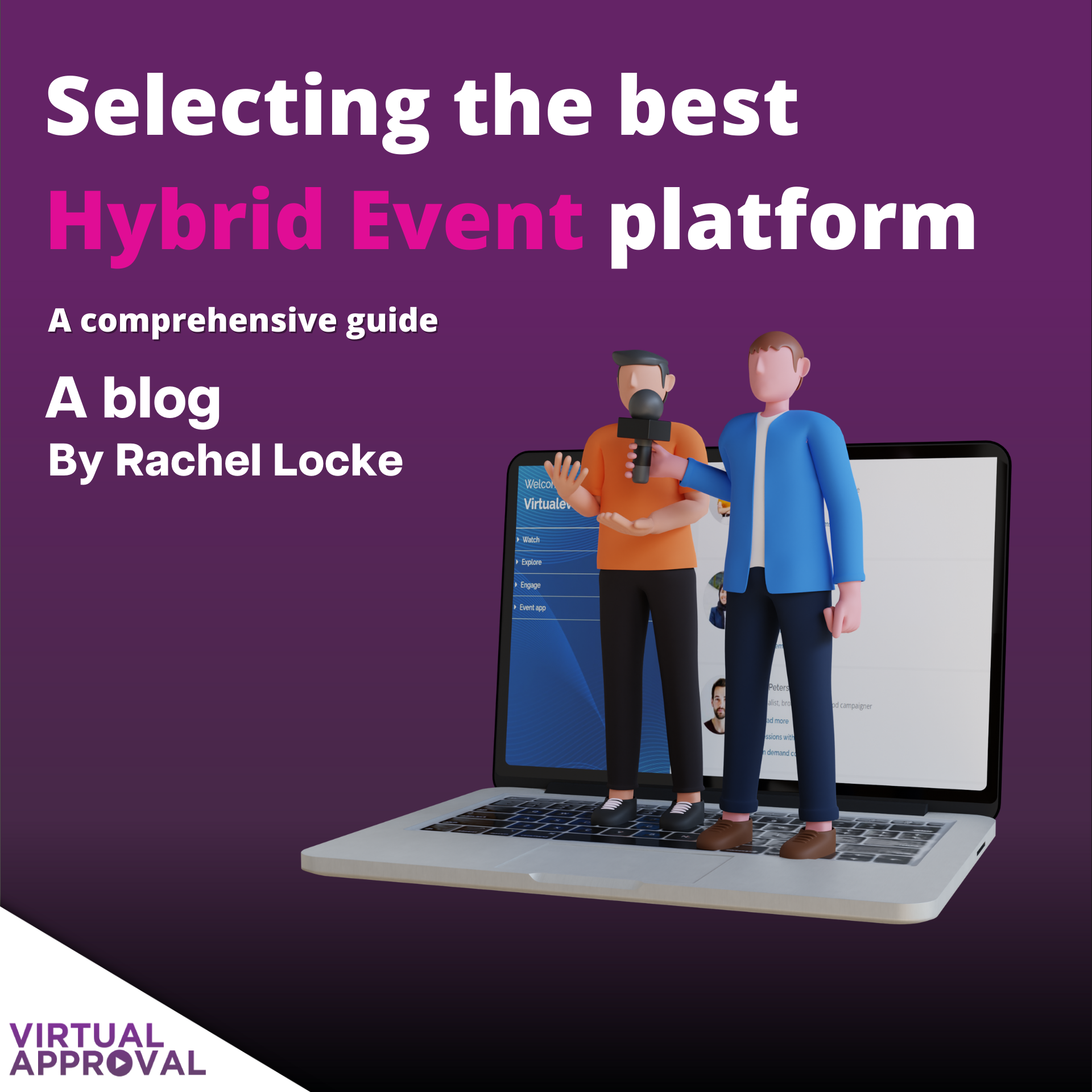
11 May 2023
Selecting the Best Hybrid / Virtual Event Platform

The hybrid event landscape has expanded significantly in recent years, fuelled by the COVID-19 pandemic and a growing recognition of the benefits of online events. As a result, event organisers now face the challenging task of choosing the right hybrid event platform from a myriad of options.
In this blog, we will guide you through the process of selecting the best virtual event platform for your needs and provide an overview of some popular platforms to consider.
Key Factors when selecting a Hybrid Event Platform:
1. Features and Functionality:
The platform should offer a comprehensive suite of features. Including live streaming, interactive polls, chat functionality, breakout rooms, gamification tools, delegate personalisation, green room for backstage etc. to provide an engaging experience for attendees. The best platforms will have inbuilt tools. However be careful as some only include the basics and other features are add-ons which can seriously impact the budget.
2. Customisability:
The ability to customise your event’s branding, layout, and design elements is crucial for creating a cohesive and professional look. Find out which elements can be customised. Ask for a demo site or working example to see the user interface.
3. Scalability:
Ensure that the platform can accommodate the expected number of attendees and can scale up if needed. Often licenses are based on capacity and there can be a big different between brackets. If your delegates are not all expected to all attend at the same time though, don’t over purchase on the server capacity. Try to collect registrations info to predict any crunch points and plan accordingly with your platform provider.
4. Integration:
Check if the platform integrates with other tools you may be using, such as event management software, CRM systems, or marketing automation platforms. If you plan to have everyone in the room and online interacting at the same time, you’ll need to ensure the app integrations are compatible with all mobile handsets.
5. Budget:
Factor in the platform cost, including subscription fees and any additional charges for features or support. Establish if the platform is a DIY build or fully serviced as the build time may be charged daily so you’ll need to be aware of any support limitations. Ensure the cost of back ups is included and read the contract.
6. Technical Support:
Choose a platform with reliable customer support to help you troubleshoot any technical issues that may arise. Ask about response times, if you will have a dedicated platform manager for the live event and what time zone they are in. What are the contingency plans in case of platform failure?! Do they have back up servers and what is the transfer time. All this is super important.
7. Compatibility:
Especially when it comes to a hybrid event your platform of choice needs to be compatible with multiple devices, not just computers.
8. Pre show:
knowing if your platform allows users to login and explore the agenda and any additional resources is an important feature to consider when selecting your platform.
9. post show:
How long will your platform be available after the show? Will there be resources and recordings available for your participants?
10. Bespoke features:
Can your platform be customisable to the extent that you can add custom plugins, games, shops?
11. Exhibitor area:
Can you showcase sponsors or exhibitors on your platform? What does that look like? Who is responsible for the content uploads?
12. Networking:
A key feature of any event is networking. what does that look like on your platform and what is the experience like for the user?

We are platform agnostic!
So before we continue, we need to be clear with something: we are platform agnostic, on purpose! We believe in providing honest, well informed advice and solutions. Having tested out 40+ different platforms, we have encountered the good, the great, the bad and the ugly. So you don’t have to take those risks on your big event! We have friends at a number of different virtual / hybrid event platforms. However no one event platform is appropriate for every kind of event we encounter. Despite knowing Tom, Harry and Lizzie; the platform development people at Platform A , B & C . We won’t recommend any platforms to our clients until we fully understand the requirements and the priorities of our client. Once we understand the needs. we can play event cupid and find the right match.
However, there are a few usual suspects out there and industry leaders in the game. The following platforms are ones we have used on our own events and would deem as reliable options. But without that initial consultation we can’t say they are necessarily the right option for you.
Hybrid Event Platforms
Zoom / Zoom Events
Known primarily for its video conferencing capabilities. Zoom also offers features such as webinars, breakout rooms, landing page and polls. These tools make it suitable for small to medium-sized virtual and hybrid events. Sometimes Zoom is a stand alone solution. Zoom can also be utilised in partnership with a custom platform. Or purpose built event page URL.
Hopin
Hopin is a versatile platform designed specifically for virtual events. With features like an interactive expo hall, networking areas, and customisable stages, Hopin caters to events of various sizes and types. We use Hopin on a regular basis including a bi-annual event that runs for 48 hours continuously. We find it to be a good reliable solution, especially since it’s integration with Streamyard backstage.
Inconf
This is a bespoke web based platform that can be scaled and adapted to suit whatever size. With additional available features such a awe dropping 3D lobby, branded photo booths and custom built games. It’s our go-to for big brand experiences with extra wow factor.
Selecting the best hybrid or indeed virtual event platform for your needs requires a thorough evaluation. Asking the question; what are your event goals, budget, and technical requirements? By considering the factors discussed in this blog post and exploring the various popular platforms available, you can make an informed decision that will contribute to the success of your event. Remember that the right platform can significantly enhance the attendee experience and create memorable events that resonate with your audience.




















